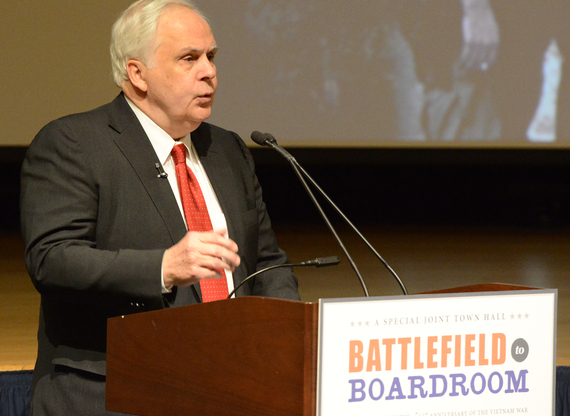When all the news is doom and gloom, as it is these days with respect to Ukraine, Venezuela, Syria and so many other places and faces, it does the heart good to read what I call a "good all-American success story."
I just read one and I would like to share it, but first an anecdote.
A couple of months ago, when one of our winter storms was pushing through the Northeast, I had to send a package to our nation's capital. It was important that the package arrive by a certain time, thus I selected Fed-Ex's "overnight express" as the method of shipment and was promised a certain time of delivery. Well, the package was delivered a couple of hours late and this created some inconveniences.
I contacted FedEx. They looked into the matter and promptly refunded me the shipping charges. No questions, no hassle, lots of well-meant apologies and acceptable explanations.
While, in this instance, the service may not have deserved the "Semper in Tempore" motto, in my opinion it certainly qualified for a "Semper Optimum" slogan.
But why this anecdote and why all this Latin?
Well, the uplifting story I just read is about a young Yale University graduate who went on to serve two tours in Vietnam with the Marine Corps under their timeless motto Semper Fidelis; about a Marine Corps officer who earned the Silver Star, Bronze Star and two Purple Heart medals in combat there and about a business man who, when he returned home from battle, founded his own company and thought about the Marine Corps motto when trying to find a suitable motto for his new company.
But that is not the only aspect of his Marine Corps experiences that Frederick ("Fred") W. Smith applied to his new company, Federal Express (FedEx), the now-$45-billion "global transportation, business services and logistics company" of which Smith is president and CEO.
For example, Smith was so impressed with the effectiveness of wartime logistics that he used that knowledge in building up his shipping company. Just as his admiration for the "precision and coordination" that close-air support with Marine Corps A-4s and F-4s brought to the battle field, inspired the integration of air-ground operations in his shipping company -- operations, today, in more than 220 countries and territories that require the air-ground integration of and coordination among 634 aircraft and over 90,000 vehicles.
Reporting on a speech Smith made at the Pentagon last week on the occasion of the 50th anniversary of the Vietnam War, David Vergun of the Army News Service says:
Another lesson Smith said he learned from the Marines was ensuring that each operating company of FedEx is managed collaboratively and is capable of operating independently. He said that was his takeaway lesson from observing the military services working together and small-unit leaders being capable of operating independently when the situation called for it.
Even FedEx's process for handling disciplinary problems is influenced by what Smith learned from the Marine Corps, such as the process of "Request Mast" which in the Marine Corps is "the right of the Marine to communicate with the commander, normally in person, and the requirement that the commander consider the matter and personally respond to the Marine requesting mast."
As a platoon leader with the 1st Marine Division in Chu Lai, South Vietnam, Smith led a few dozen good men and, subsequently, as commander of Kilo Rifle Company, he led a couple hundred Marines, including in the battle for the ancient Hue City, one of the longest and bloodiest battles of the Vietnam War.
As CEO of FedEx, Smith leads a civilian workforce of some 350,000 people worldwide.
In his speech at the Pentagon, referring to his men in Vietnam, Smith said, "They were the finest group of young men you could ever have -- courageous beyond belief -- and the memory of that is with me every day of my life."
As CEO of FedEx, Smith holds his employees in similar high esteem and attributes FedEx's success and the fact that FedEx was recently named No. 8 on Fortune magazine's list of the most admired companies to his people: "The reason that happened had nothing to do with me...It had to do with those 350,000 folks."
And that brings me back to mottoes and "all that Latin"
According to Vergun:
Part of [developing FedEx] was getting a fitting motto and a mission statement, [Smith] said, recalling the famous Marine motto, Semper Fidelis, or "always faithful."
While it's not in Latin, the FedEx motto is short enough to remember, he said, and fits the mission: "I will make every FedEx experience outstanding."
Because the primary FedEx color is purple, the FedEx motto is known as the "Purple Promise," a promise that includes "Do whatever it takes to satisfy our customers" and "Always treat customers in a professional, competent, polite and caring manner." I'll attest to that! (Fed-Ex has an entire booklet on the "Purple Promise.")
Personally, I would have made the motto a little shorter and used Latin. Something like "Semper Optimum - Semper In Tempore."
But, then again, I am not the CEO of a Fortune 100 company nor is Latin my forte.
CODA:
One "delivery system" of military origins FedEx will not be using anytime soon is the drone. While FedEx has several drone studies underway, the idea of using drones for deliveries is "almost amusing," Smith said during a recent conference call.
Lead Image: Fred Smith, CEO of FedEx, speaks about his wartime experiences and about FedEx at the Pentagon, Feb. 28, 2014 during the event "Battlefield to Boardroom." U.S. Army photo by David Vergun

